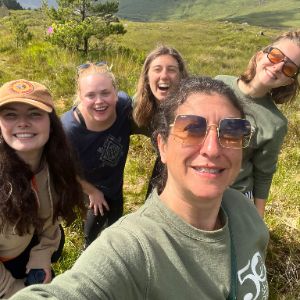Prenote: I am not saying Recycling is a bad thing, but our current main stream systems of recycling have failed us.
In July 2019 The Guardian shared an article titled “Humans have made 8.3 billion metric tonnes of plastic since 1950” If you missed it the link is at the end of this blog.
The Curr...
Sustainability has so many definitions that it can often drive people to distraction…
What does it actually mean? How do I make my own business more sustainable? How do I know if I am successful at greening my business?
The answers are much simpler than people may think and I'll tell you why.
Her...
We are beyond thrilled to spring into February on a very positive note!
In collaboration with KWETB Training Services (Kildare/Wicklow Education & Training Board of Ireland) we are presenting an online Environmental Education programme to secondary schools.
This pilot project allows us to bring t...
Reducing carbon emissions should not be left to the large corporations alone. There are small changes and steps we can ALL learn to reduce our own carbon footprint.
Yes, I agree that for real impact it is vital that large corporations and governments adopt different policies when it comes to prote...
“Fly if you like, I won't judge you” was a statement that Greta Thunberg gave to The Sunday Times Magazine as she turned 18.
This sentence really got me thinking about influence and divisive ideals and opinions. Something we are seeing more and more in modern society in the midst of this Trump era,...
The modern society we have collectively created has its pros and cons...
Many might feel that having supermarkets where you can buy EVERYTHING in one place, is a welcomed development in our society. It seems that convenience is prioritised above all else (even above reducing the food waste).
Has t...
First of all a very HAPPY NEW YEAR to you all!
I hope 2021 is kinder to all of us than 2020 has been...
As we all delve into New Year’s resolutions, I wanted to start my year talking about a country I admire and have followed the progress of for a few years now - Costa Rica.
This blog, is a littl...
While I am sure you have all seen by now many posts about “Shopping local this Christmas” the message is soooo important that I could not pass this opportunity to give you my opinion.
According to digitalcommerce360, Amazon has reported it’s most profitable quarter this year increasing sales by 32....
Fifty Shades Greener, and the Educational Training Boards of Ireland, headed by KWETB, have partnered to deliver Environmental Training to the hospitality industry workforce in Ireland.
This project is funded by SOLAS and there will be no cost at all for businesses.
It has never been more importan...
It does not feel like award season this year, does it?
The fancy dinners in black ties are long gone from our diary’s as we try to stay away from social contact and everything we now as “normal”.
But it stills remains, more important than ever, to recognize those businesses that achieve a level of...
Waste is one of the most colossal challenges of our times. Waste production continues to increase and Ireland is now facing a potential waste mountain with no place to go. For some facts and stats continue reading to the end of this blog.
The first step to reducing waste at your hospitality busines...
When was the last time you took time out of your day to review the energy your hotel or restaurant uses?
Following staff wages, your energy consumption could possibly be one of the largest costs to your business. Yet every week I meet hospitality managers that don’t have control over their energy c...


